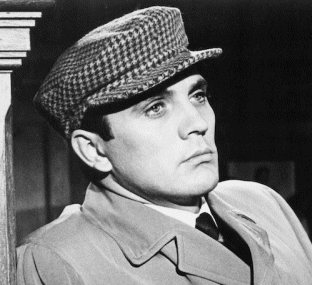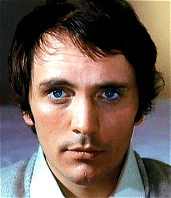 |
The sixties
proved a busy time for Terence Stamp. At one time he shared a flat with
Michael Caine and during the decade was involved in two well-publicised
affairs, the first with actress Julie Christie, the second with model Jean
Shrimpton. As a handsome leading man, he seemed destined to become a major
star. But, despite the fact that his career in the movies continued up to
the present time, his major roles faded away in the Seventies. Stamp made
his film debut in 'Billy Budd', the Herman Melville tale of an innocent
seaman who, due to a series of unfortunate circumstances, is executed by
hanging.
He next appeared in 'Term of Trial', a drama in which a schoolteacher (Laurence
Olivier) is accused of molesting a schoolgirl (Sarah Miles). Stamp was promised
the lead in 'The L-Shaped Room', but when Brian Forbes took over as director
he had casting ideas of his own and signed Tom Bell. Stamp's next major
role was in 'The Collector', the bizarre John Fowles novel which told of
a young man so obsessed with a girl that he kidnaps her - and decides to
make a hobby of his crime.
Following his Broadway appearance in 'Alfie', he was offered the lead in
the screen version, but turned it down to appear in the abortive 'Modesty
Blaise' instead. His flatmate Michael Caine went on to portray 'Alfie'.
Terence next signed up for the role of the swinging sixties photographer
in 'Blow Up', a part specially written for him by Italian director Michelangelo
Antonioni. The plan was for Jean Shrimpton to appear in the film with him.
Shortly before filming began, Antonioni changed his mind and decided to
use an unknown, David Hemmings, instead - even though he had to pay Stamp
because he'd already signed a contract for the part. Stamp's next appearance
was as the dashing cavalry officer in 'Far From The Madding Crowd' with
Julie Christie and he then left for Hollywood to star in 'Blue' a Western
which Robert Redford had wisely turned down. The next stage of his career
took him to Italy at the invitation of renowned directors Federico Fellini
and Pier Paolo Pasolini and his Italian film appearances included 'Una Stagipone
All' Inferno', 'La Dovona Creatura', 'Amp Non Amp' and 'Morte In Vatoco'.
An East-Ender born in 1940, Stamp was the son of a Thames tug driver. He
left school at 16 and took a variety of jobs before winning a scholarship
to drama school. Over the years he has developed an interest in Eastern
philosophy and mysticism and is the author of three volumes of autobiography.
As a veteran actor he has proved to be more successful than as a leading
man and has appeared in more than sixty films. His Sixties filmography is:
'Billy Budd' (1962), 'Term of Trial' (1962),'The Collector' (1965), 'Far
From the Madding Crowd' (1967), 'Poor Cow' (1967), 'Histoires Extraordinaires'
(1967), 'Theorem' (1968), 'Blue' (1968) and 'The Mind of Mr. Soames' (1969).
Terence Stamp died on 17th August 2025, at the age of 87. Film maker Edgar
Wright, who directed him in his final screen role 'Last Night in Soho',
wrote in part:
"Terence was kind, funny, and endlessly fascinating. I loved ... reminiscing
about his films, going back to his debut in Billy Budd. Terence was a true
movie star: the camera loved him, and he loved it right back". |

